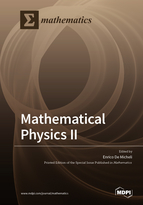Mathematical Physics II
A special issue of Mathematics (ISSN 2227-7390). This special issue belongs to the section "Mathematical Physics".
Deadline for manuscript submissions: closed (29 February 2020) | Viewed by 42585
Special Issue Editor
Interests: mathematical physics; potential theory and harmonic analysis; thermal quantum field theory; quantum computation; regularization theory; special functions of mathematical physics; computational physics
Special Issue Information
Dear Colleagues,
The impressive adequacy of many physical theories with experimental observations has always been a stimulating beacon for mathematical physicists, whose wish is to achieve coherent representations and a coherent understanding of the various branches of physics in terms of mathematically well-defined objects.
The mathematical beauty of the classical theories of the nineteenth century evolved in the first-half of the twentieth century towards the revolutionary ideas of Special Relativity and the puzzling concepts of Quantum Mechanics, which boosted the use and development of sophisticated algebras.
The synthesis of these two paradigms—Quantum Field Theory—provides an outstanding and intriguing theoretical framework for the mathematical formulation of physical theories. Analyticity properties investigation of structure functions and scattering kernels, harmonic analysis of groups, unitary representation theory, algebraic geometry, and operator algebras are just a few examples of the numerous profitable mathematical tools that are normally applied. Mathematical methods that also find fruitful application in Quantum Information Theory are the more recent encounter of quantum ideas with Information Theory and those that allow for the exploration of challenging topics such as entanglement theory, quantum communication channel theory, and algorithm design for quantum computation.
The Guest Editor solicits research papers and reviews that present essentially a mathematical approach to physical problems.
Dr. Enrico De Micheli
Guest Editor
Manuscript Submission Information
Manuscripts should be submitted online at www.mdpi.com by registering and logging in to this website. Once you are registered, click here to go to the submission form. Manuscripts can be submitted until the deadline. All submissions that pass pre-check are peer-reviewed. Accepted papers will be published continuously in the journal (as soon as accepted) and will be listed together on the special issue website. Research articles, review articles as well as short communications are invited. For planned papers, a title and short abstract (about 100 words) can be sent to the Editorial Office for announcement on this website.
Submitted manuscripts should not have been published previously, nor be under consideration for publication elsewhere (except conference proceedings papers). All manuscripts are thoroughly refereed through a single-blind peer-review process. A guide for authors and other relevant information for submission of manuscripts is available on the Instructions for Authors page. Mathematics is an international peer-reviewed open access semimonthly journal published by MDPI.
Please visit the Instructions for Authors page before submitting a manuscript. The Article Processing Charge (APC) for publication in this open access journal is 2600 CHF (Swiss Francs). Submitted papers should be well formatted and use good English. Authors may use MDPI's English editing service prior to publication or during author revisions.
Keywords
- Mathematical methods in Physics
- Quantum fields
- Lie groups in Physics
- Complex analysis in Physics
- Spectral analysis
- Statistical Physics
- Approximation theory
- Algebraic geometry in Physics
- Differential equations
- Asymptotic methods
- Operator algebras
- Quantum Information theory
- Quantum communication channels
Benefits of Publishing in a Special Issue
- Ease of navigation: Grouping papers by topic helps scholars navigate broad scope journals more efficiently.
- Greater discoverability: Special Issues support the reach and impact of scientific research. Articles in Special Issues are more discoverable and cited more frequently.
- Expansion of research network: Special Issues facilitate connections among authors, fostering scientific collaborations.
- External promotion: Articles in Special Issues are often promoted through the journal's social media, increasing their visibility.
- e-Book format: Special Issues with more than 10 articles can be published as dedicated e-books, ensuring wide and rapid dissemination.
Further information on MDPI's Special Issue polices can be found here.






